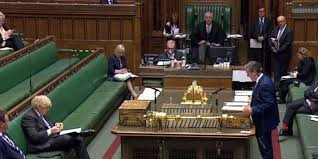After a few weeks, I feel the trauma of the experience has receded enough for me to tell this story.
It all started a little while before the lockdown. Remember those times? When we thought we could handle objects on supermarket shelves with no threat to life? When we used to shake people’s hands? Chat to them without masks? We were in the little town of Manises, not far from our home outside the fine old city of Valencia.
We were there to complete the latest round of formalities that Spanish residents have to go through, in order to obtain some document, whose precise nature I can no longer clearly remember, though it was doubtless immensely important and an essential ingredient for a happy life in 21st century Spain.
On the other hand, it may have been to pay some tax or other. That’s another activity that’s popular with the Spanish bureaucracy.
We took the opportunity to wander around the place a little and find out what it offered in the way of exciting amenities. This was useful, because we had only been there in the evenings to play badminton (another receding memory, still banned in these Coronavirus times). We hadn’t seen much of the rest of the town.
Then we returned to the car. Only to discover that the keys had vanished. Both of us had seen them go into Danielle’s bag. Neither of us had seen them come out. We’d been to few places where they could have been expected to fall from the bag. In fact, really the only place was the tax office (yes, I think it was that). We went back, but there was no sign of the key. We tried the police, but they hadn’t had anything handed in either.
So we had to accept the inevitable. Neither of us had ever lost a key before, but now we somehow had. It was a sad record to break but, hey, life is full of things that just happen.
Getting the car back was a little awkward, involving a return trip home by taxi to collect a spare car key, with the help of our neighbour, who holds a copy of our house keys. But it was done in time, and we quickly ordered another key for the car.
Two weeks later, it still hadn’t arrived, but the lockdown had. The garage shut down. We couldn’t collect the new spare key even when it did arrive.
Fast forward 100 days to the end of the strict ‘confinement’ we crawled though in Spain.
The glorious day eventually came when we could return to the beach. And with friends. Things weren’t quite back to normal, so if we had travelled in the same car as the friends, we would all have had to wear masks. So we took two cars. Which turned out to be quite fortunate.
Because after a seven or eight kilometre walk through a nature reserve and along a beach, we got back to the cars, only to discover again that the keys were no longer in Danielle’s bag. We all searched. We took everything out of the bag, turned it upside down and shook it. No keys fell out.
We went back over the walk, with no greater success.
It seemed extraordinary. Having never previously lost a key in our lives, we had now managed to lose two in just over three months. I won’t hide it from you: it was a pretty depressing discovery.
To misquote Oscar Wilde, to lose one key may be regarded as a misfortune, to lose two looks like carelessness.
Our friends were immensely kind. They took us first to the garage. The new key was available, but not usable, since it has to be programmed first. We had to find a way to get the car to the garage, which isn’t easy without a working key. While there, we ordered yet another key, to make sure we had a spare again.
Then our friends took us home, which at least didn’t take them too far out of their way: they live just half a dozen doors away from us. We walked disconsolately indoors. Danielle decided to get something out of my bag.
And found – the car keys.
It remains a complete mystery how the keys moved from her bag into mine. But somehow they did. We’ve decided that this is an enigma we’re never going to solve. Any more than the mystery of how it never occurred to any of the four of us on that walk to look in my bag for the keys, after not finding them in Danielle’s.
Another lift from our friends enabled us to collect the car. And the very next day, we had a call from the garage. The new key had turned up just 24 hours after we’d ordered it, unlike the previous one which took at least two weeks. So we couldn’t cancel it.
 |
| Three of a kind: an insurance policy |
I’ve been back to the garage and got both new keys programmed and usable. So we now have three keys for the car.
Which may be just as well. With our track record, a bit of an insurance policy against key loss feels like a good investment.






















